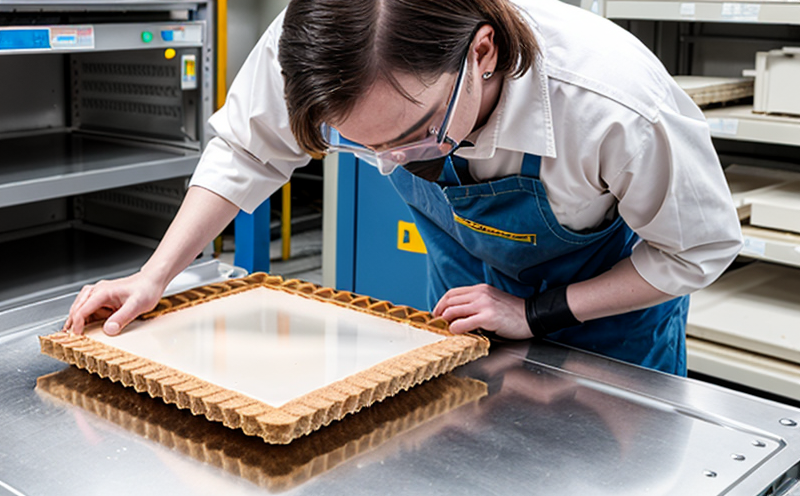ASTM F1323 Wafer Thin Film Conductivity Testing
The ASTM F1323 standard is a critical tool in semiconductor and microchip testing, specifically targeting wafer thin film conductivity. This service ensures that the electrical properties of thin films on silicon wafers meet the necessary specifications for reliable performance in electronic devices.
Thin film conductivities are pivotal in the development, manufacturing, and quality assurance processes within the semiconductor industry. The ASTM F1323 test is particularly important because it allows for precise measurement of conductivity across a range of thin film materials used in microchips. This includes metals such as copper, aluminum, gold, and other alloys that form part of the interconnects or contacts on silicon wafers.
The process involves depositing a thin layer onto a substrate (typically a wafer) using techniques like sputtering, evaporation, or chemical vapor deposition. The ASTM F1323 test measures how well this thin film conducts electricity under specific conditions, which is essential for ensuring that the microchip functions correctly and efficiently.
Test parameters are stringent to ensure accuracy and reliability. Typically, samples undergo thorough preparation before testing, including cleaning, conditioning, and possibly etching if necessary to remove any surface contaminants or defects that could affect conductivity measurements. Once prepared, the sample is placed into a controlled environment where it is subjected to a known electrical current at defined temperatures and pressures.
The result of this test provides valuable insights into the quality and performance of the thin film. It helps identify potential issues early in the manufacturing process, allowing for corrective actions before proceeding further with production. Compliance with ASTM F1323 ensures that semiconductor manufacturers adhere to internationally recognized standards, enhancing trustworthiness and marketability.
The benefits extend beyond mere compliance; it also supports continuous improvement efforts by providing actionable data on product performance. This information is crucial for research and development teams looking to innovate within the semiconductor sector.
Benefits
- Precision Measurement: ASTM F1323 ensures accurate measurement of thin film conductivity, critical for reliable microchip operation.
- Early Detection: Identifies potential issues in the manufacturing process early, preventing costly rework or scrap.
- Compliance Assurance: Ensures adherence to internationally recognized standards, enhancing product reliability and trustworthiness.
- Data-Driven Insights: Provides valuable data for R&D teams to improve product performance and innovation.
The ASTM F1323 test plays a vital role in maintaining high-quality standards within the semiconductor industry. By ensuring that thin films meet specified conductivity levels, this service contributes significantly to the overall quality and reliability of semiconductors.
International Acceptance and Recognition
The ASTM F1323 standard is widely accepted and recognized in the semiconductor industry for its rigorous approach to thin film conductivity testing. This international acceptance underscores the importance placed on precision and reliability within this sector, where even slight deviations can have significant implications.
International standards such as ISO 9001, ISO/IEC 17025, and IEC 61000-4-3 are often referenced alongside ASTM F1323 to ensure comprehensive compliance. These standards collectively aim at enhancing the quality management systems of laboratories involved in testing and calibration services.
Recognition from leading organizations like IEEE (Institute of Electrical and Electronics Engineers) further emphasizes its importance in the field. Laboratories accredited according to these guidelines are trusted providers, ensuring that results obtained through ASTM F1323 testing are credible and reliable.
Use Cases and Application Examples
- New Product Development: Ensures new thin film materials meet required conductivity specifications before mass production.
- Fault Detection: Identifies defects in the manufacturing process that could affect electrical performance of microchips.
- Quality Assurance: Regularly conducted to maintain consistent quality across different batches or versions of a product.
- R&D Optimization: Provides data for researchers and engineers to refine thin film materials and deposition techniques.
- Certification Compliance: Necessary documentation required by regulatory bodies for certification purposes.
- Supplier Evaluation: Used in evaluating the quality of suppliers' products, ensuring consistency across supply chains.
- Failure Analysis: Assists in identifying root causes of failures in microchips through detailed analysis of thin film properties.
- Process Monitoring: Continuously monitors production processes to ensure ongoing adherence to specified standards.
These use cases highlight the versatility and significance of ASTM F1323 wafer thin film conductivity testing across various stages of semiconductor development, manufacturing, and quality control. Its role in ensuring product reliability cannot be overstated, making it an indispensable part of the industry's quality assurance framework.





